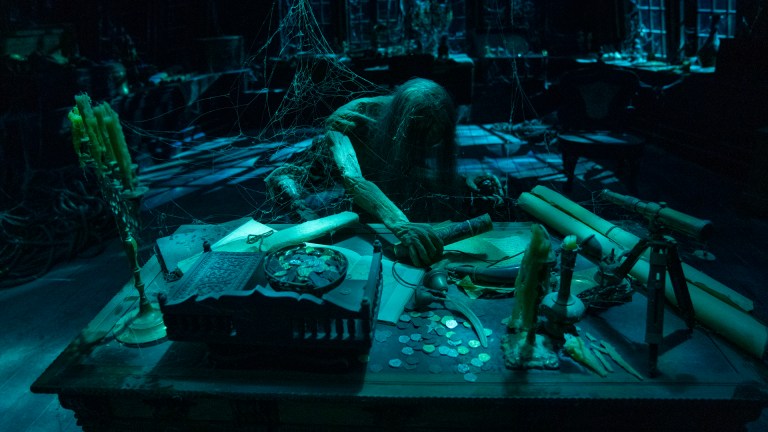How Lovecraft Country Silences Yahima
HBO’s Lovecraft Country introduces Yahima, an Arawak Two-Spirit character, but in the process perpetuates some harmful tropes about native and gender-variant people.

This Lovecraft Country review contains spoilers.
Lovecraft Country is a rapturously violent dramatic horror series where pain and death are par for the course. And while the show delights in depicting wickedness, the violence always feels purposeful. Even with that in mind, however, last week’s episode, “A History of Violence,” makes the disappointing choice to unceremoniously kill Yahima, an indigenous, gender-variant character.
After an Indiana Jones-esque journey through a booby-trapped tunnel Tic, Leti, and Montrose enter Titus Braithwhite’s underwater vault, a room full of the remains of indigenous people —made apparent by their regalia— and a corpse holding Titus’ pages from the Book of Adam. When Montrose attempts to grasp the pages, the corpse reanimates. The camera lingers on the naked figure, and Montrose asks “what are you?” The recently-reanimated individual introduces themselves as Yahima, “Woman—and man, two-spirit. Neither. Both. All”
Yahima is an Arawak, the indigenous ancestors of modern-day Taino people. They’re from Guyana —”the land of many waters”— a country in the Carribean region of South America. They are Two-Spirit, which is an exclusive Indigenous-American umbrella term —like LGBTQ— for a unique gender identity that encompasses gay, lesbian, nonbinary, intersex, transgender, and other queer or gender-nonconforming identities. (Two-spirit as a term was coined in 1990, so Yahima would not use it as an identifier.) Physically, Yahima presents as intersex, a person who is born with a combination of male and female biological traits. They may also read as trans. As such they represent both the native community and the gender-variant one.
European colonization and Christian indoctrination reconceptualized the definitions and functions of gender and sex in indigenous communities in the Americas and around the world. Still, many native tribes recognize a Third Gender, while some acknowledge as many as five genders or more. The Navajo, for example, have four distinct genders. More traditional tribes reject the term Two-Spirit as it reinforces the binary of “male” and “female” which is thought to be a Western construct. Gender and sex are complex concepts, but the Two-Spirit identity and the spiritual/gender identities it encompasses, is rich with native cultural significance.
The inclusion of an indigenous character and an intersex character in a high profile show is momentous because those identities are grossly underrepresented. It should be noted that the actress portraying Yahima, Monique Candelaria, is a cisgender woman, who uses she/her pronouns, and describes herself as ”ethnically mixed with Spanish, French, Aztec and Apache Indian.” Characters who occupy very specific cultural identities should be played by performers who share those identities, especially when there are so few opportunities for gender-nonconforming roles. But the inclusion itself is creditable.
Tic is magically able to understand Yahima —who speaks Lokono, an Arawak language— and we learn Yahima’s story through Tic’s interpretation, instead of directly from Yahima through use of subtitles. We learn that Titus Braithwhite came to their land looking for people to translate the Book of Adam. Yahima recognized the symbols from the caves of Alomun Kundi, and with no reason to distrust Titus, agreed to decipher the pages. When they saw Titus for what he was, they refused to continue their translation. Titus murdered their entire family, then imprisoned them in a grave. Yahima used the pages to protect themself.
Yahima tells Tic,“You are not guilty of your forefather’s sins, But I do not know your spirit. I will not help you.” So Montrose grabs for the scroll, again, this time triggering the vault to flood. Montrose and Leti make way toward the elevator, but Tic pauses to save Yahima, even amidst Yahima’s refusal to help decipher the pages. As the elevator ascends, Yahima attempts to speak, but instead unleashes a piercing scream. They are made into a siren, so they cannot speak if they escape Titus’ vault, which effectively silences them. Later, after Montrose has failed to sabotage Tic by losing the scroll, he takes away Tic’s only chance to decipher the pages by slitting Yahima’s throat. This is an egregious act of violence on an indigenous, gender-variant person by a Black, queer-coded man.
In the episode we see Titus’ literal history of violence in both his public trophies of conquest on display at the museum, and his private collection of stolen legacy locked away in his vault. The episode speaks to the lasting harm of colonialism and the specific violence visited upon the indigenous communities whose land, resources, people, and cultures were systematically stripped from them. Through Yahima, that violence could be confronted in a way that empowers indigenous and/or gender-variant viewers, the way Black viewers are empowered when Tic collapses a house on a group of racist white men. Yahima has survived for centuries, and may well be able to survive this. But unless and until that possibility is realized, we have to sit with the gratuitous murder of a potentially groudbreaking native, gender-variant character.
Gender nonconforming people —and intersex, trans, androgynous, two-spirit people— are some of the most vulnerable of the population, especially if they are BIPOC. Depictions of gender variant people in entertainment media often otherizes them, and their stories frequently comprise of violence, and end in death. Introducing Yahima only to immediately kill them off in a brutal, callous way perpetuates this tired and harmful trope and normalizes violence against these groups. It also deprives underrepresented people the ability to be reflected, and respected, in the stories they consume.
Lovecraft Country gives its Black characters the tools to fight their demons and their oppressors, and it works so well because it punches up. Black characters visiting the same violence on other marginalized folks that their oppressors visit on them is not empowerment. “For the master’s tools will never dismantle the master’s house.” — Audre Lorde